The Intel Core i5-7600K (91W) Review: The More Amenable Mainstream Performer
by Ian Cutress on January 3, 2017 12:01 PM ESTGrand Theft Auto V
The highly anticipated iteration of the Grand Theft Auto franchise finally hit the shelves on April 14th 2015, with both AMD and NVIDIA in tow to help optimize the title. GTA doesn’t provide graphical presets, but opens up the options to users and extends the boundaries by pushing even the hardest systems to the limit using Rockstar’s Advanced Game Engine. Whether the user is flying high in the mountains with long draw distances or dealing with assorted trash in the city, when cranked up to maximum it creates stunning visuals but hard work for both the CPU and the GPU.
For our test we have scripted a version of the in-game benchmark, relying only on the final part which combines a flight scene along with an in-city drive-by followed by a tanker explosion. For low-end systems we test at 720p on the lowest settings, whereas mid and high-end graphics play at 1080p with very high settings across the board. We record both the average frame rate and the percentage of frames under 60 FPS (16.6ms).
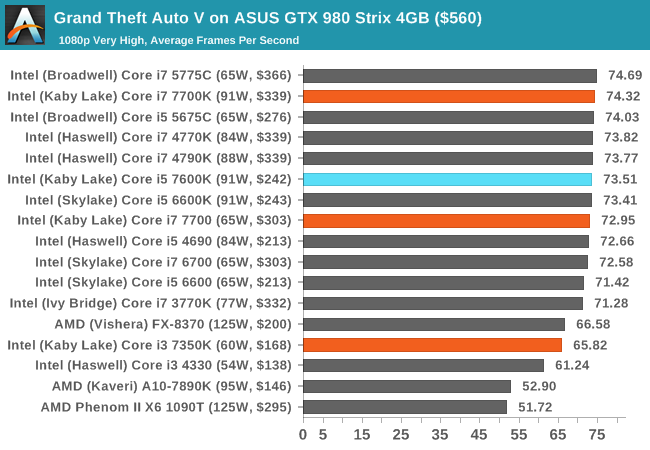
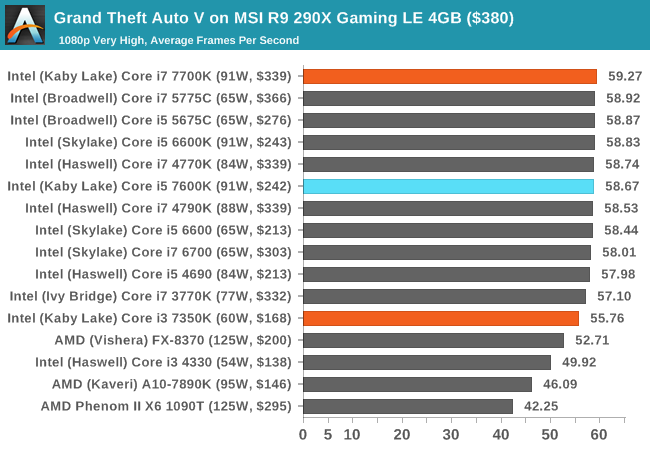
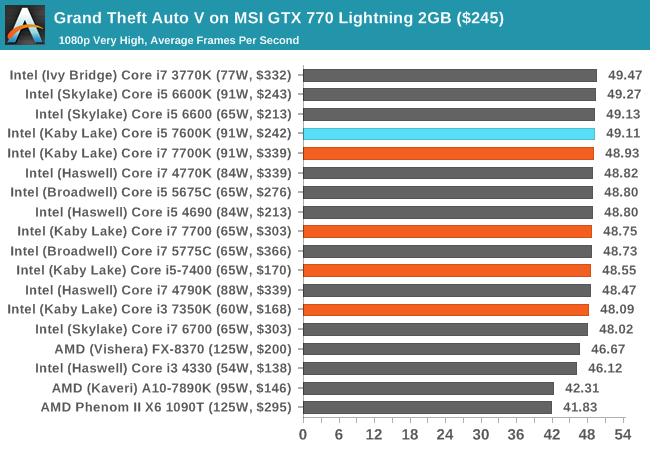
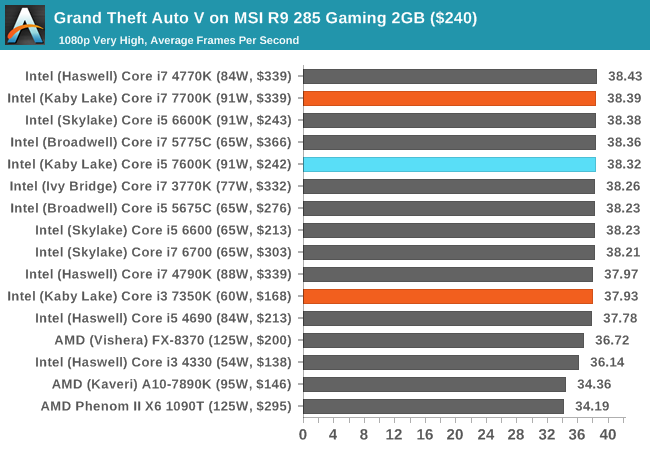
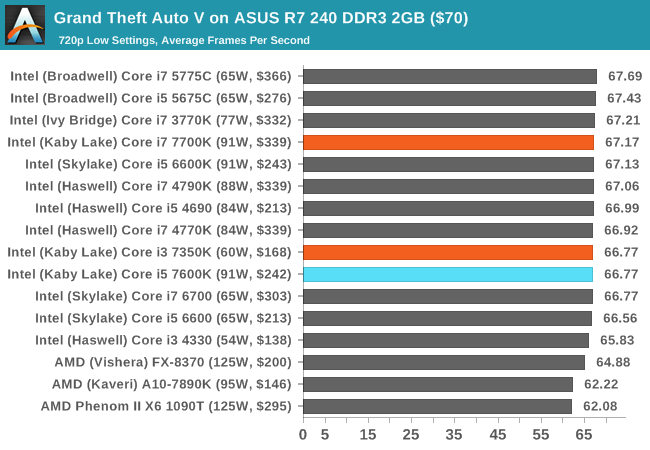
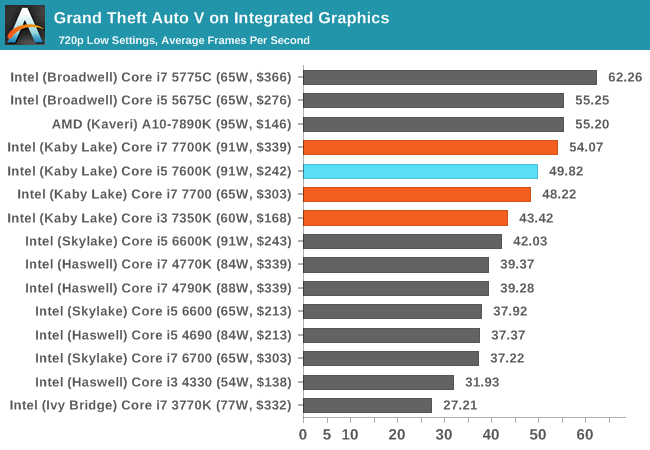


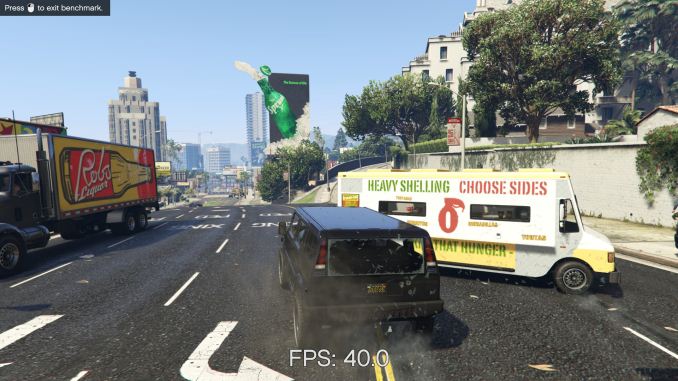








70 Comments
View All Comments
Chaitanya - Tuesday, January 3, 2017 - link
Probably the most useless upgrade in recent years for PC users.Sabresiberian - Tuesday, January 3, 2017 - link
1) This is only an optimization of an existing architecture, and2) Anyone knowledgeable will almost always recommend skipping at least one architectural generation and, especially considering the slow improvements over the last 5 years, at least 2 generations. Which means if you are in a use-case scenario that can take advantage of the increased CPU performance you shouldn't be thinking "upgrade" unless you are running Sandy Bridge or earlier.
(The obvious exception that breaks the rule here is Zen, which will offer a huge performance increase over Bulldozer.)
Shadow7037932 - Wednesday, January 4, 2017 - link
>(The obvious exception that breaks the rule here is Zen, which will offer a huge performance increase over Bulldozer.)How about we wait until it's actually released? Remember what happened with the original Phenom?
silverblue - Wednesday, January 4, 2017 - link
I don't think it's unreasonable to get excited about Zen, at least in terms of AMD's current product lines. Potentially massively optimised benchmarks aside, at least they tested Ryzen engineering samples against Intel's more expensive offerings in public without resorting to slides containing unsubstantiated performance claims. In fact, the only thing I can see in print is the "40% faster than Excavator" claim. If the Canard PC leaks aren't fake, there's every chance that AMD have achieved this, and possibly exceeded it.You mentioned Phenom, so let's take a trip down memory lane:
Phenom: "40% faster than Core 2 Quad at the same clock speed"
Reality: Up to 40% slower per clock after the TLB bug; needed Phenom II to really close the gap.
Bulldozer: "50% faster than the i7 950"
Reality: In what test? Even the 8350 couldn't boast this.
I don't see Ryzen being the gaming top dog - remember, current productivity and gaming demos have been against slower clocked CPUs with double the cores of your garden variety, highly clocked i5 and i7 - but I don't think it's unreasonable to expect that it'll bury the FX series. IMHO, of course.
boozed - Friday, January 6, 2017 - link
I think the problem is that if Skylake wasn't enough of a performance improvement to upgrade, neither is Kaby Lake.Murloc - Tuesday, January 3, 2017 - link
is it?I'm running a nehalem, if I was upgrading now I'd appreciate the lower power consumption and the HEVC hardware support.
willis936 - Wednesday, January 4, 2017 - link
Was HEVC hardware not present on the 6x00 series?Shadow7037932 - Wednesday, January 4, 2017 - link
He said Nehalem, which is the i7 920 and the like.close - Wednesday, January 4, 2017 - link
@Shadow7037932, can you name one good reason why he should update his Nehalem to a Kaby Lake K part that didn't exist one and a half years ago with Skylake?I'll put it another way: If someone passed on a Skylake upgrade last year why exactly would they pay the same price to get a pre-overclocked Skylake (aka Kaby Lake) this year? Why did the user suffer through an extra ~18 months of really aging hardware just to buy what's basically the same CPU at the same price today?
Since these 2 generations share architecture and fabrication process there's no reason to expect consistently better OC on the 7 series. So the 300MHz should be within reach for any K part and any user.
MonkeyPaw - Tuesday, January 3, 2017 - link
Looks like it is the best 14nm Intel architecture you can buy. Still, it seems like if you're in the market now, you might as well wait to see if Ryzen will be a compelling option. If nothing else it might help drive some of these prices down.